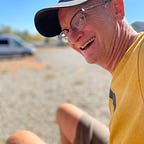Planting More Trees is Not the Solution to the Climate Crisis
“Trees do not preach learning and precepts. They preach, undeterred by particulars, the ancient law of life.” Herman Hesse
Trees are getting their time in the spot/sunlight right now.
From Ethiopia’s recent tree-planting record (350 million in one day!) to feature articles in nearly every major publication, planting more trees (up to a trillion!) to solve the climate crisis is gaining big-time traction right now.
As a tree lover and hugger (try it sometime), I’m totally down with planting more trees — and caring for our existing trees more tenderly, especially our elders (the ones that really do the heavy lifting of sequestering carbon and creating forest + planet health).
Now, as an original Dr. Feelgood (all natural, all positive, all the time), I like the storyline, but I’m a little suspicious of this approach. I think this “quick fix” line of thinking falls into our society’s infatuation with “more,” especially regarding solutions to this climate mess we’ve gotten ourselves into. (Add “easy” and “convenient” into that combustible stew of human infatuation and foible.)
If we want to solve the climate crisis, we can (and should) plant more trees — but we really need to focus on less, rather than more, particularly those of us in the developed world who are the primary creators of climate change and most of whom have more than enough already.
The question then, is, “How much is enough?”
As my high school Spanish teacher used to say, “Bastante es bastante.” Enough is enough. (Though in all honesty it may have been used about our classroom behavior rather than as a consumptive philosophy.)
Enough is enough. Which means we need to get comfortable with the idea of “less,” which translates to becoming comfortable with being a little less comfortable. I’m making progress personally and professionally with this objective, which I frame as striving to create more energy than I consume. (There’s that “more” sneaking in — I’ve found that success in this equation typically means consuming less.) I’m no saint, but I’m getting there. I won’t list the actions I’ve taken as they seem trite and small and self-congratulatory. Plus, I have a long way to go. It’s taking concerted thought and active work, but I’m making headway on this objective in my life and with the business I run (Oliver Russell, a certified B Corporation).
The same goes for the business world and our expectations for it. We, as citizens and customers (note the absence of “consumer”) need to demand that companies (and governments, while we’re at it) consume less and produce more responsibly. The best way to do that is to reward or withhold our dollars and to use our time, talent, and voices to raise the level of action. You might even have to yell once in awhile.
There’s no magic feel-good pill that will solve the climate crisis. It’s going to take sacrifice from us all. So what say you, friend? Are you up for a little less in your life? I believe that’s the secret to solving the climate crisis, with a side benefit I’ve noticed personally that reducing the burden of acquisition can be a key that also unlocks personal happiness in the process. You ought to give it a go.
Now let’s go plant some trees.
Resources and Inspirations
Thinking about planting trees at your house? Not all trees are created equally when it comes to global warming — here’s an article that can help guide your tree selection.
Doing more and better with less: Global Sustainable Development Goal (SDG) Number 12 — Responsible Consumption and Production — can help you better understand the problem and the opportunity here. Stay awhile and check out the rest of the 17 SDGs.
For the bookish among you, here are a couple of must reads:
The Hidden Life of Trees by Peter Wohlleben — a real gem that will fill you with wonder and shift how you look at trees.
The Overstory by Richard Powers — a jaw-dropping novel with intertwined stories throughout a branching narrative that will have you spellbound from page one — this year’s Pulitzer Prize winner.
Keeping the literature thread intact, I’ll end through the personal and fuzzy lens of long-ago recollection. I may have gained my lifelong love for trees (and perhaps poetry) when my mother, brother and I routinely pulled out at a roadside stop along Idaho’s Salmon River to read a small sign with this poem written by Joyce Kilmer more than 100 years ago (1914). Enjoy:
Trees
By Joyce Kilmer
I think that I shall never see
A poem as lovely as a tree.
A tree whose hungry mouth is prest
Against the earth’s sweet flowing breast;
A tree that looks at God all day,
And lifts her leafy arms to pray;
A tree that may in Summer wear
A nest of robins in her hair;
Upon whose bosom snow has lain;
Who intimately lives with rain.
Poems are made by fools like me,
But only God can make a tree.
